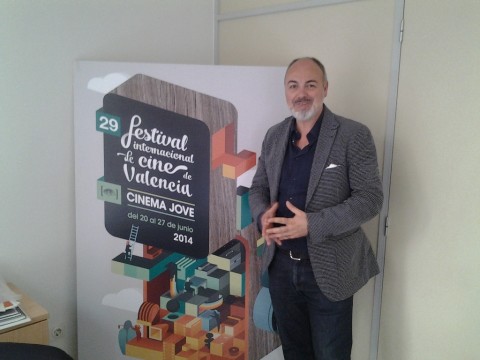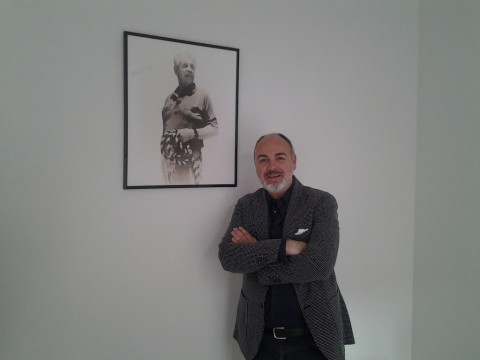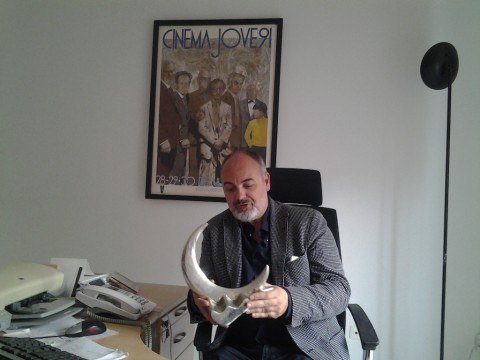Luis Berlanga is undoubtedly Valencia’ greatest film director, and an icon of the seventh art in Spain.
One man whose career has been closely linked to Berlanga is Rafael Maluenda, currently, and since 2000 the director of Valencia’s film festival Cinejove.
Rafael is one of those lucky people who has always known what he wanted to do, and has been able to do it; or at least, almost.Born in Monovar, Alicante in 1967, Rafael attended school at the Santo Domingo school in Orihuela, an epoch he remembers fondly.
He also remembers that from an early age he was a big fan of Elvis Presley, and the high level of English he has today has its origins in the times when he wanted to understand the lyrics of the King of Rock and Roll.
Unlike his brothers and sister, he always knew what he wanted to do, to work in the film industry.
He spent an outrageous amount of time in Monovar’s three cinemas when he was young, one of which, run by the church, showed all the old classics. This constant presence in front of the silver screen was partly due to the non-existence of video at that time, and he began to organise the information he was obtaining by cutting out articles about the cinema, and faced with the dilemma of how to organise the increasing amount of information, finally decided to classify by directors.
In 1988 he left Monovar to study in Valencia, where, in the absence of a film school, he opted for psychology.
He also gate-crashed some courses in the philology faculty on film.
In 1992 a life changing event occurred when the great Valencian film director Luis Berlanga gave a talk in a female student residence (a mere detail that did not deter Rafael from attending), and a relationship that would last a lifetime began.
As his questions were too technical for the tome of the conference, he ended up in the street afterwards talking to Berlanga for about an hour.
His relationship with Berlanga restarted when the Maestro made Todos a la Carcel in Valencia’s (thankfully) unoccupied Modelo prison in the summer of 1993.
It took Rafael three days to get past security, after which Berlanga gave him a free run of the set, and his education really began.
Starting off with the most menial of tasks, he soon developed relationships with all the famous actors he had long admired and an understanding of the nuts and bolts of film making.
Berlanga insisted that he should first make a short film, a failure which taught him a lot, as failures do.
The short was called Juego de Llaves and led to a number of participations in various films, and, significantly, the film was accepted to compete in the Valencia Film Festival, alongside names that would later resonate in the world of Spanish cinema, names like Santiago Segura, Paco Plaza and Alejandro Amenába, a festival which Rafael had first stumbled upon, almost literally in 1991 when he saw a poster and decided to find out what it was all about.
Today the poster adorns the wall of his office, to remind him of his modest beginnings.
In 1996 he collaborated with Berlanga on the making of a series about Blasco Ibañez, the great Valencian writer; a man made in the mould of Hemingway; but before Hemingway.
Later he made another short film called Demasiado Tarde.
Rafael’s connection with the festival became closer as he was more and more called upon to participate in the organisation each year, at the same time that his shorts began to make headroom around Spain, and by 1997 he was among those selecting which films would compete in the yearly festival.
At the end of 1998 he was once again working with Berlanga, on what would be his last feature film, Paris Tombuktu.
For this film Rafael controlled the monitor which showed each scene that was shot, which made him very popular with the actors, who were always desperate to see how they looked, while Berlanga himself largely ignored them.
In his final years Berlanga pushed for the creation of the City of Light film studios project, a good idea that went wrong.
Rafael’s project own was to continue making films and eventually move on to feature films, but in December 1999 he received an offer he couldn’t refuse, an amputated horse’s head in his bed. Oops, wrong story; his offer was to take over the running of the Cinejove film festival, an offer that was made, as interesting offers often are, in Finnegan’s Irish pub.
His first festival was the 15th, that of 2000, and since then many big names, but more discrete names with big talents, have passed through the festival, names like Richard Lester, who has directed many great films in Spain, including one with John Lennon. Lester also made The Beatles’ film Hard Days Night.
Rafael resists the temptation to programme the kind of films he himself likes for the festival and tries to focus on a broad spectrum of tastes, while remaining loyal to the fundamental premise of the event to promote and foster the future of the Spanish film industry, providing opportunities to young, up-and-coming directors and actors.
As a consequence, many household names of today have a fond memory and feeling about the festival that gave them one of their first opportunities, people such as the Italian director Matteo Garone, who won the festival in 1998 with Ospiti, and is now world famous for the series Gommorah, or Australian director Andrew Dominick who participated in the 2001 festival with Chopper, and has since made Killing Me Softly and The Assassination of Jesse James with Brad Pitt.
The list of names is impressive, and Rafael recites them with obvious pleasure and admiration: Joachim Lafosse, Nicolas Winding Refn, Radu Jude, Cristian Mungiu, Maren Ade, Tom Alfredson, Thomas Vinterberg, Jack Cardiff, Jirí Menzel, Mike Sarne, Stephen Frears, Catherine Breillat, Jerzy Skolimowsky, Karoly Makk, Lone Scherfig, Kevin Smith, Jose Giovanni, Julie Delphy, Menahem Golan and Elías Querejeta.
This year the festival, Valencia Int. Film Festival – Cinema Jove, to give it its full, official name in English, to will be as international as ever with films from Britain, France, Germany, Italy, Sweden, and also Iran, all competing for the coverted trophy, the Luna de Valencia.
Films will be shown in the IVAM and MUVIM museums, in the French Institute, the Rialto cinema and in the open air in Viveros park, and of course the Astoria Hotel will be the nerve centre, where a lot of the talks , workshops and events will take place.
But still Rafael’s first love is film making, and two projects are under development, as they say; one about the life of Berlanga, and another about the Valencia motorcycle racer Ricardo Tormo.
The Valencia Film Festival is not Cannes and it’s not the Oscars, and yet, year after year it has proven to be a director’s and artist’s festival, and one about which Valencia can feel proud.
2015’s festival runs from 19th until the 26th June.



